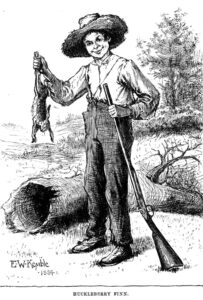Thursday, October 12th, 2017...11:08 pm
Fact: Nonstandard English is grammatical.
Yin Liu
Fallacy: Some very commonly used English words or structures are ungrammatical.
What a linguist considers ungrammatical English and what a lot of other people consider ungrammatical English are often very different. Here, for example, is a sentence (from the opening of Mark Twain’s Adventures of Huckleberry Finn) that a lot of English speakers might call ‘ungrammatical’:
- That ain’t no matter.
Here’s something that a linguist would consider ungrammatical (that’s what the little asterisk means in this case):
- * Not does matter that.
What makes something grammatical or not? It should be straightforward: an utterance or text is grammatical if it follows the rules of grammar. The issue here, though, is what the rules of grammar are, and who makes them.
From a modern linguist’s point of view, a language’s rules of grammar are what make the use of that language systematic and predictable. Something is grammatical in that language if a fluent speaker of that language would produce that utterance spontaneously and meaningfully, and be understood by other speakers of that language. In other words, if English speakers say it, it’s grammatical in English. The first-person narrator of Huckleberry Finn, who speaks a rural dialect from the American South, uses English systematically and therefore grammatically. Huck uses a verb form such as ain’t, for example, in completely consistent and meaningful ways. Twain himself defended his language in an Explanatory Note at the beginning of the novel:
In this book a number of dialects are used, to wit: the Missouri Negro dialect; the extremest form of the backwoods South-Western dialect; the ordinary ‘Pike-County’ dialect; and four modified varieties of this last. The shadings have not been done in a hap-hazard fashion, or by guess-work; but painstakingly, and with the trustworthy guidance and support of personal familiarity with these several forms of speech (Twain 3).
Linguistic rules of grammar are made by speakers themselves, and usually unconsciously. Every time you say something in a language meaningfully and successfully communicate your meaning to someone else who knows that language, you have followed the grammatical rules of that language. When Mark Twain, writing in the character of Huck Finn, begins his novel with the sentence ‘You don’t know about me, without you have read a book by the name of The Adventures of Tom Sawyer but that ain’t no matter’ (Twain 4), he communicates successfully to English-speaking readers of the book. He’s not breaking any rules of grammar.
What makes *not does matter that ungrammatical is that no fluent speaker of English would naturally produce such a sequence when trying to communicate, and no fluent speaker of English would be able to figure out what it is supposed to mean. All the words in that sequence are English words, but the order in which they are presented does not follow the rules of English syntax.
The perception that a sentence like that ain’t no matter is ‘ungrammatical’ comes from an attitude that linguists call prescriptivism: the idea that a specific variety of a language, the ‘standard’ variety, is the only correct way to use the language. Standardisation happens to languages for a lot of (usually social and historical) reasons, but it does not in itself make some forms of a language ‘right’ and other forms ‘wrong’. It simply makes one variety of a language more consistent and systematic, like reducing the number of possible ways of spelling that to one. Prescriptivism, however, attaches moral judgements to language forms, by suggesting that nonstandard varieties and forms of a language (also called ‘vernaculars’) are inferior or even ungrammatical. That’s where people get the common misconception that, for example, ‘ain’t isn’t a word’ or that ‘ain’t isn’t English’. Rubbish. Ain’t is included in all good English dictionaries, although the way it was handled in Webster’s Third New International Dictionary (1961; ed. Philip Gove) caused an uproar in the USA that baffled the rest of the English-speaking world. Ain’t is a perfectly legitimate English word. It only happens to be nonstandard, but that’s for social reasons, not linguistic ones.
Language rules and social rules are completely different things. When we confuse the two, problems arise. The English word barbarian comes from a rather snooty idea held by the ancient Greeks that anything that wasn’t Greek wasn’t a real language, and anyone who didn’t speak Greek wasn’t saying anything meaningful, just making sounds like ‘bar bar bar’ (see OED, s.v. barbarous). In the same way, the misconception that nonstandard varieties of English are ‘ungrammatical’ or ‘incorrect’ has been used to denigrate speech communities whose form of English was not that of the group in power.
Twain’s novel is, in part, about a character who comes to suspect that the rules of his society — such as the rule that it is wrong to help a slave escape — might be, because they are merely human and artificial rules, worth breaking in some cases. As with perceived ‘rules’ of grammar, it’s important to ask who is making the rules and whether they are actually part of the natural order of things, or whether they are in fact invented by human beings with all the complex reasons that humans usually have when they try to constrain the behaviour of others.
Works Cited and Consulted
[OED]. Oxford English Dictionary Online. Oxford University Press, 2017.Skinner, David. The Story of Ain’t: America, Its Language, and the Most Controversial Dictionary Ever Published. HarperCollins, 2012.
Twain, Mark [Samuel L. Clemens]. The Adventures of Huckleberry Finn. Oxford University Press, 1999.

Comments are closed.